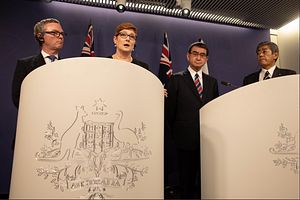Japan is prepared to sell its submarines to Australia should protracted negotiations between state-owned French shipbuilder Naval Group and the Australian government for the construction of 12 French-designed diesel-electric boats collapse, according to Japanese Foreign Minister Taro Kono.
“That’s possible – but it’s up to the Australian government to decide,” Kono said in a television interview with the Australian Broadcasting Corporation ahead of the eighth Australia-Japan 2+2 Foreign and Defense Ministers’ Meeting, which took place on October 10 in Sydney. Kono added that he does not know how long it would take for Japan to prepare an official offer. “Well I have to check with (the) defense ministry and related industry,” he said.
Long thought to be the frontrunner for a Australian $50 billion ($36 billion) contract to build Australia’s new submarine fleet in partnership with Australian industry under the so-called SEA 1000 Future Submarine Programme, Japan failed in its bid for the submarine contract in 2016. Instead, Australia awarded French shipbuilder Naval Group a design and mobilization contract for the construction of 12 Shortfin Barracuda Block 1A submarines, a diesel-electric derivative of Naval Group’s Barracuda-class nuclear attack submarine (SSN), in December of the same year.
Negotiations over an Australian-French strategic partnering agreement (SPA) — needed before detailed design contracts can be finalized and submarine construction begins — have reportedly now been stalled as a result of disagreements over intellectual property and warranty conditions, as well as Australian concerns over the impact if Naval Group is no longer owned by the French state, according to media reports.
The Australian government and Naval Group, however, have dismissed these claims. “There is no delay to the delivery of 12 Future Submarines,” Australian Defense Minister Christopher Pyne tweeted on September 30. “Negotiation of strategic partnering agreement is continuing & we will ensure we end up with an equitable & enduring agreement to deliver the capability our servicemen & women need, and get the best deal for Australian taxpayer.”
The SPA is slated to be signed in early 2019, with construction of the first boat to begin in 2022, should the two sides come to an agreement.
In 2016, Japan failed in its bid for the submarine contract for multiple reasons including a general lack of experience in selling Japanese military hardware abroad paired with the Japanese defense industry’s unwillingness to export sensitive military technology to Australia. Additionally, according to the Australian government, the French design also better met the Royal Australian Navy’s capability requirements—a statement that has been repeatedly questioned ever since. (Notably, the new Shortfin Barracuda Block 1A design entails a swap from a nuclear-powered to a conventionally-powered propulsion system, which may prove a difficult technical challenge to overcome for the French design team.)
According to Japanese media reports, much has changed over the past two years in Japan’s defense industry and military bureaucracy. Japan would now completely commit to co-develop and locally-built a submarine fleet in Australia. This would entail transfer of some of Japan’s most advanced military technologies to Australia. Japanese defense officials have reportedly also explored the option of co-producing an entire new class of subs for the Japan Maritime Self Defense Force in Australia as the service will need to begin replacing its submarine fleet in the late 2020s and 20230s.
































